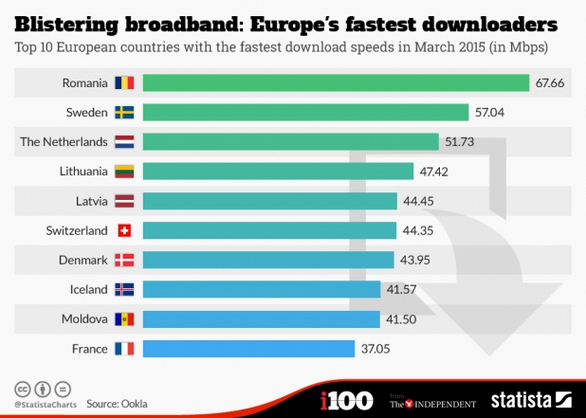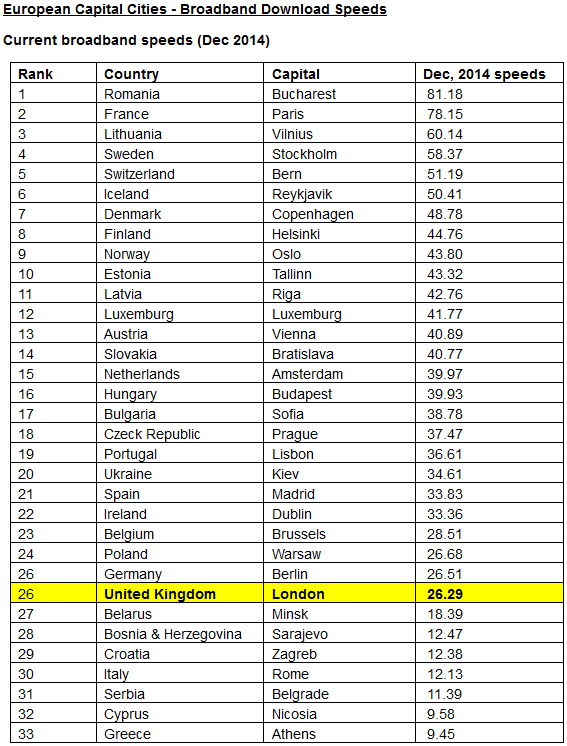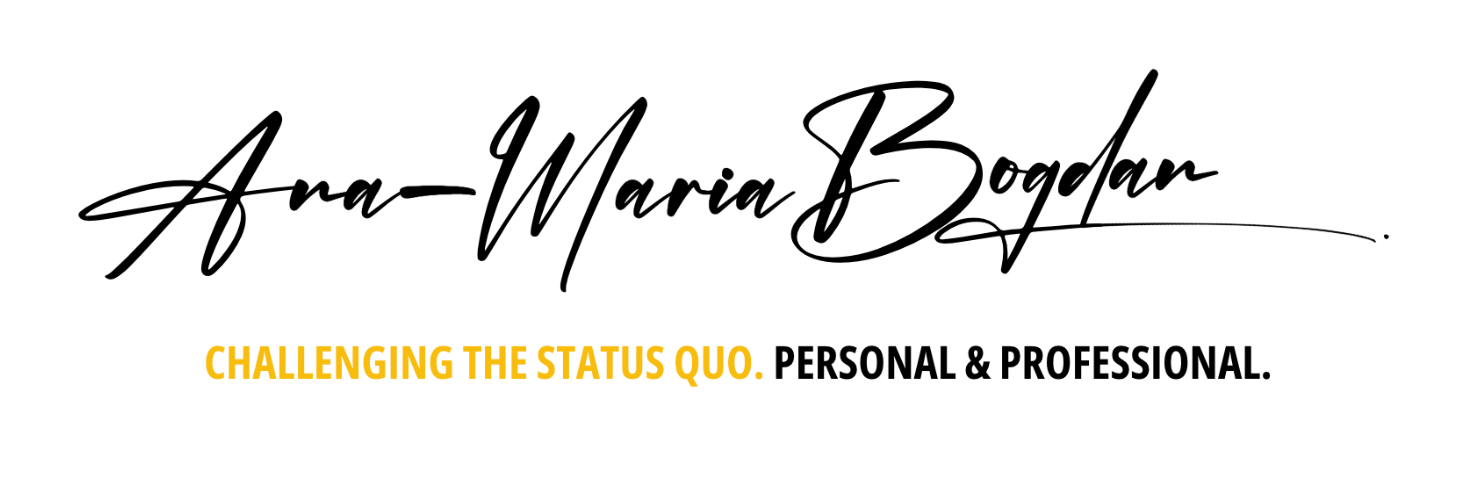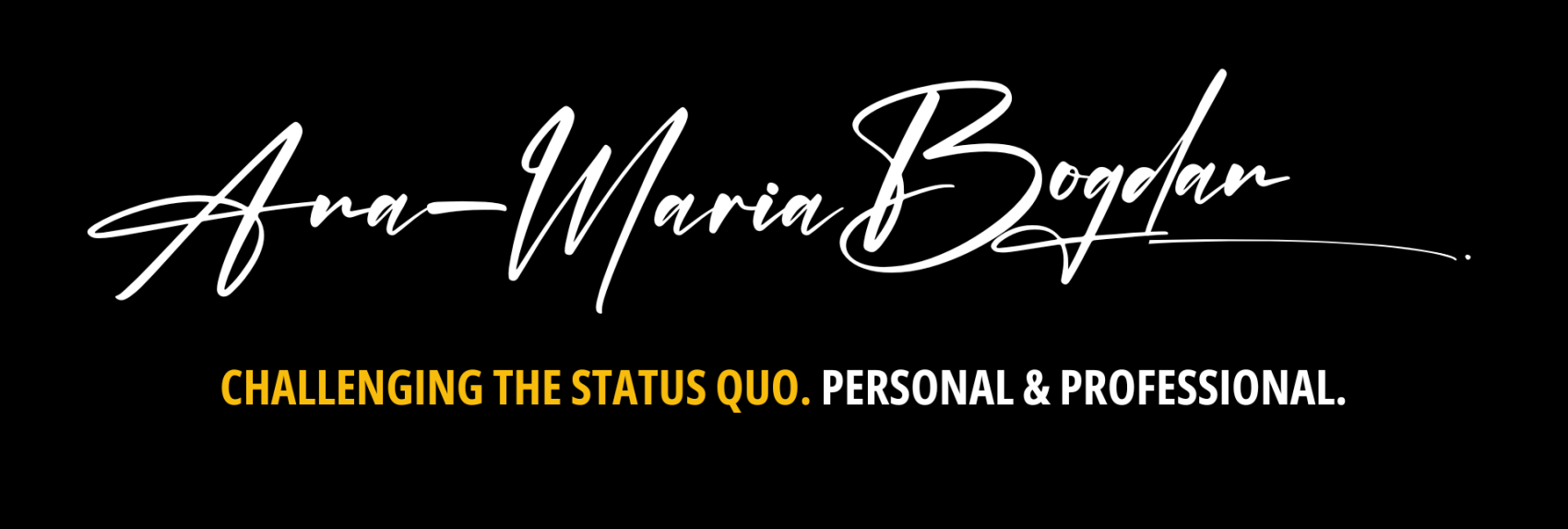When it comes to Romania and Romanians, there are many things that can surprise you and broadband internet download speed is one of them. We are the fastest downloaders in Europe, and fourth globally.
With 69.62 Mbps, Ookla’s ranks Romania as the European capital with the fastest broadband download speed, and in fourth country in the world, after Singapore (116.06Mbps), Hong Kong (112.15 Mbps) and South Korea (73.12 Mbps).

Source: The Independent (UK)
2015 Ookla global ranking
This is Ookla’s 2015 top 50 country ranking looks like. See the 198 country listing, click here.

2015 Ookla global ranking
2014 ISP Hyperoptic Report

Source: 2014 ISP Hyperoptic report
Last year the British fibre optic broadband ISP Hyperoptic published a new index published ranking European capital cities by broadband speed. With an average download speed of 81.2 Mbps, Bucharest tops this ranking, surpassing cities such as Paris, London, Berlin, Amsterdam, Helsinki, Vilnius, Stockholm or Warsaw. The ranking includes 33 European capitals, the European average download speed being of 38.6 Mbps.
Source: 2014 ISP Hyperoptic report
In 2014 ISP Hypeoptic report, London ranks 26th with an average of 26.29 Mbps, behind former eastern communist cities such as Budapest – 39.93 Mbps, Sofia – 30.78 Mbps, Prague – 7.47 Mbps; or western capitals such as Berlin – 26.51 Mbps, Brussels – 28.51 mbps and Dublin – 33.36 Mbps.
The British promise
Back in 2012, Jeremy Hunt (Culture Secretary), in a speech at Google’s Campus in East London, promised to British citizens that UK would have the “fastest broadband of any major European country” by 2015, with access for 90 per cent of the country; the remaining 10 per cent would be able to access the internet at speeds of two megabits per second (Mbps) or above.
Broadband adoption strategy
Despite of all political and economical drawbacks, Romania played its broadband role well by adopting Romania adopting in 2007 its broadband national policy (The Regulatory Strategy for the Romanian Electronic Communications Sector for 2007-2010), ahead of countries such as Ireland (2008), Germany (2009), Poland (2010), France (2010), UK (2010), US (2010) or Sweden (2011)
In 2014, 49% (around 8.5 millions) of the Romanians had a smartphone with permanently connected to Internet.
Conclusion
With a highly-educated population speaking at least one foreign language, fast internet connections, several great technical universities, more and more technology companies investing in local development centers, financial support and encouraging legislation, IT&C sector does have a good chance of being the main growth driver for Romania.
Note on Bucovina: I should mention that Moldova (see first chart above), officially the Republic of Moldova, it’s the Romanian-speaking country located between Romania to its west and Ukraine to its north, east and south. In August 1939, the Molotov–Ribbentrop Pact and its secret additional protocol were signed, by which Nazi Germany recognised Basarabia as being within the Soviet sphere of influence, which led the latter to actively revive its claim to the region. The following year, namely on June 28, the Soviet Union, issued an ultimatum to Romania requesting the cession of Basarabia and northern Bucovina, with which Romania had to comply the following day. Soon after, the Moldavian Soviet Socialist Republic (Moldavian SSR, MSSR) was established. To present day there are many voices on both sides of river Prut that divides the two territories asking for a reunion.


